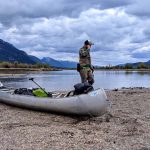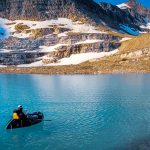WHAT IS APPLIED RECONCILIATION?
Applied Reconciliation is the lens we apply to all our water stewardship work in territories of Indigenous Peoples. We strive to align our water stewardship efforts with Indigenous People’s priorities to develop a cross-cultural approach to Reconciliation between Indigenous and non-Indigenous People, government and policy makers. We value intergenerational work, Indigenous ways of knowing, and the interweaving of this knowledge for collective water monitoring priorities.
PROGRAM GOALS
Meaningful collaborations and partnerships with Indigenous Peoples regarding water stewardship priorities.
INDIGENOUS ENGAGEMENT HIGHLIGHTS 1994-2025
Living Lakes Canada's water stewardship work is carried out on the traditional territories of Indigenous Peoples across what is known as Canada. This means our programs are guided by the priorities of the Indigenous Peoples who have the responsibility of caring for these lands and waters. Our relationships with local communities, Indigenous and settler, are built on shared values of healthy water and water stewardship, and are foundational to building community and ecosystem climate resilience.
The timeline below highlights the relationships we have fostered through Applied Reconciliation:
- 2025 - In collaboration with the Yaq̓it ʔa·knuqⱡi’it Fire Brigade and Grasmere Community Society, Living Lakes Canada is expanding its water resource mapping project to the Grasmere/Yaq̓it ʔa·knuqⱡi'it area to support local wildfire response.
- 2025 - Hosted by Yaq̓it ʔa·knuqⱡi’it First Nation, Living Lakes Canada, and the Elk River Alliance, the Without Water Symposium brought together over 50 delegates to discuss watershed challenges and foster relationships across sectors and worldviews. Featuring a keynote address by Grand Chief Steward Phillip and a panel discussion with voices from Yaq̓it ʔa·knuqⱡi’it First Nation, local government, industry, science, and non-profit organizations, the event demonstrated a collaborative model for strengthening local watershed governance by uniting diverse knowledge systems and resources to protect watershed health. Read the What We Heard report.
- 2025 - Living Lakes Canada is leading a shoreline survey of Francois Lake, B.C., using the Foreshore Integrated Management Planning protocol, guided by a diverse steering committee that includes representation from Ts’il Kaz Koh First Nation. A findings report will be released in Spring 2026, including Foreshore Development Guidelines to support local First Nations, communities, and governments in sustainable shoreline planning.
- 2025 - In partnership with the Piikani Nation Lands Department and the Oldman Watershed Council, Living Lakes Canada engaged with Piikani First Nation members through various community meetings to better understand local groundwater priorities and concerns. These conversations will help guide the development of a community-based groundwater monitoring network. Engagement efforts also included a presentation at the “Fire, Water, Land and Air: Piikani Climate Risks and Strategic Workshop,” hosted by Piikani Nation Lands Department and The Resilience Institute.
- 2023-2025 - Through the Columbia Basin Water Monitoring Framework, Living Lakes Canada works collaboratively with First Nations across the Basin to align site selection and monitoring activities with Indigenous water priorities. This includes stream, lake, climate, and groundwater monitoring sites, some of which are monitored in partnership with First Nations.
- 2025 - Following recommendations made at the 2023 Celebrating the Lakes event, Living Lakes Canada hosted the Yukon Lakes Virtual Roundtable to share project updates, strengthen connections, and spotlight local lake monitoring efforts. Speakers included representatives from Carcross/Tagish First Nation and the Dena Kayeh Institute.
- 2025 - At the BC Assembly of First Nations Water Forum in Vancouver, Living Lakes Canada Executive Director Kat Hartwig moderated the panel “Water in the Wake of the Trump Administration: Transboundary Decision-Making to Protect BC's Water Security in Foreign and Domestic Policy."
 Yaq̓it ʔa·knuqⱡi’it Fire Brigade. Yvonne Miller Photo
Yaq̓it ʔa·knuqⱡi’it Fire Brigade. Yvonne Miller Photo
- 2024 - Living Lakes Canada is working with Upper Nicola Band and Fisheries and Oceans Canada to develop a State of the Watershed report with restoration recommendations for the Nicola Watershed. This work will involve lake water quality investigations, cyanobacteria monitoring, Foreshore Integrated Management Planning, river and stream health assessments, biodiversity baseline studies, and invasive species habitat assessments to get a holistic picture of the health of the watershed.
- 2024 - In 2024, Living Lakes Canada delivered a two-day Lake Monitoring Workshop to First Nations Guardians and Government along with Yukon Parks staff in partnership with Yukon Parks and the Water Resources Branch. This follows the “Celebrating The Lakes” event convened by Living Lakes Canada in December 2023 where an active community of practice was a key vision from the event.
- 2024 - Living Lakes Canada partnered with the Piikani Nation to pilot innovative groundwater detection technology aimed at developing a community-focused groundwater monitoring framework in Alberta. The project is currently being piloted in the Oldman River Watershed, with plans to expand into the Bow River Basin and other regions of Alberta.
- 2024 - Living Lakes Canada delivered an environmental DNA (eDNA) training to Simpcw Resources Group and Simpcw First Nation in collaboration with Jared Hobbs (J. Hobbs Ecological Consulting Ltd.) and the Helbing lab (University of Victoria) as part of the iTrackDNA project. Participants learned applications and considerations of using eDNA methods while gaining practical experience with sample collection.
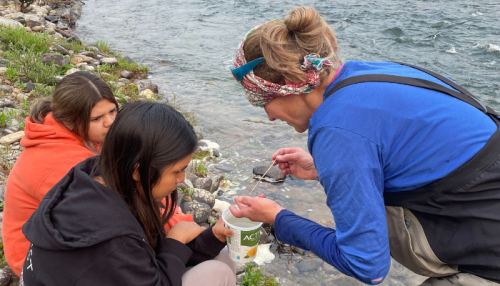 2023 ʔaq̓am Youth Water Gathering, BC. Living Lakes Canada Photo
2023 ʔaq̓am Youth Water Gathering, BC. Living Lakes Canada Photo
- 2023-2024 - Living Lakes Canada built collaborative relationships with other environmental stewardship NGOs that prioritized Reconciliation in the quarterly dialogues led by Watersheds BC. These conversations explored how NGOs could apply UNDRIP to their environmental stewardship work.
- 2022-2024 - In partnership with the Upper Nicola Band, Living Lakes Canada co-developed and field tested the Indigenous Knowledge and Values Framework for Foreshore Integrated Management Planning on Nicola Lake, showcasing how Indigenous Knowledge and Western science can holistically align and be applied to decision making together. The framework is a template for the application of Nation-specific Indigenous Knowledge. The project’s resulting Nicola Lake Foreshore Development Guidelines identified 19 Culturally Sensitive Areas along the shoreline and offer evidence-based recommendations to protect the lake’s sensitive habitats.
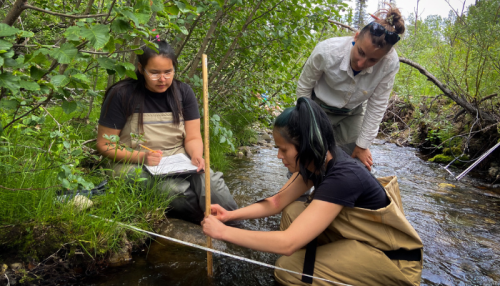 2023 STREAM & CABIN training in Whitehorse, YT. Living Lakes Canada Photo
2023 STREAM & CABIN training in Whitehorse, YT. Living Lakes Canada Photo
- 2023 - Living Lakes Canada delivered iTrackDNA field trainings in British Columbia with Blueberry River First Nation in Fort St. John and Gitanyow First Nation in Hazelton to support ongoing eDNA projects and explore the potential for future ones. Inter-generational Indigenous community members were trained in Targeted eDNA field sample collection. Participants deepened their proficiency with the methods and improved their internal capacity for the fieldwork.
- 2023 - In collaboration with the Government of Yukon, Living Lakes Canada led the first phase of relationship building to explore lake monitoring in the territory, with nine First Nations and other Indigenous groups from the Yukon and Northern BC. A key focus of this project was to understand the contributions from both Indigenous and Western knowledge systems to lake stewardship and to report back to participants (read the Sharing Back report).
- 2023 - Living Lakes Canada delivered a range of water monitoring trainings to six First Nations across Western Canada. In the Canadian Columbia Basin specifically, we assisted in organizing two youth Water Gatherings led by the ʔaq̓am Guardians in Training, combining Ktunaxa culture with Western science water monitoring workshops. This youth-led project enabled Indigenous and non-Indigenous youth to learn together about water stewardship from both Western Science and Ktunaxa perspectives, and facilitated cross-cultural relationship-building between participants.
- 2023 - Living Lakes Canada hired an Indigenous Youth Ambassador who, in addition to attending conferences and presenting at our youth-focused events, wrote the multi-media column series “The Youth Perspective” that combined youth and Indigenous storytelling on important topics related to freshwater conservation. The Youth Perspective has been published on platforms across Canada, including The Starfish Canada.
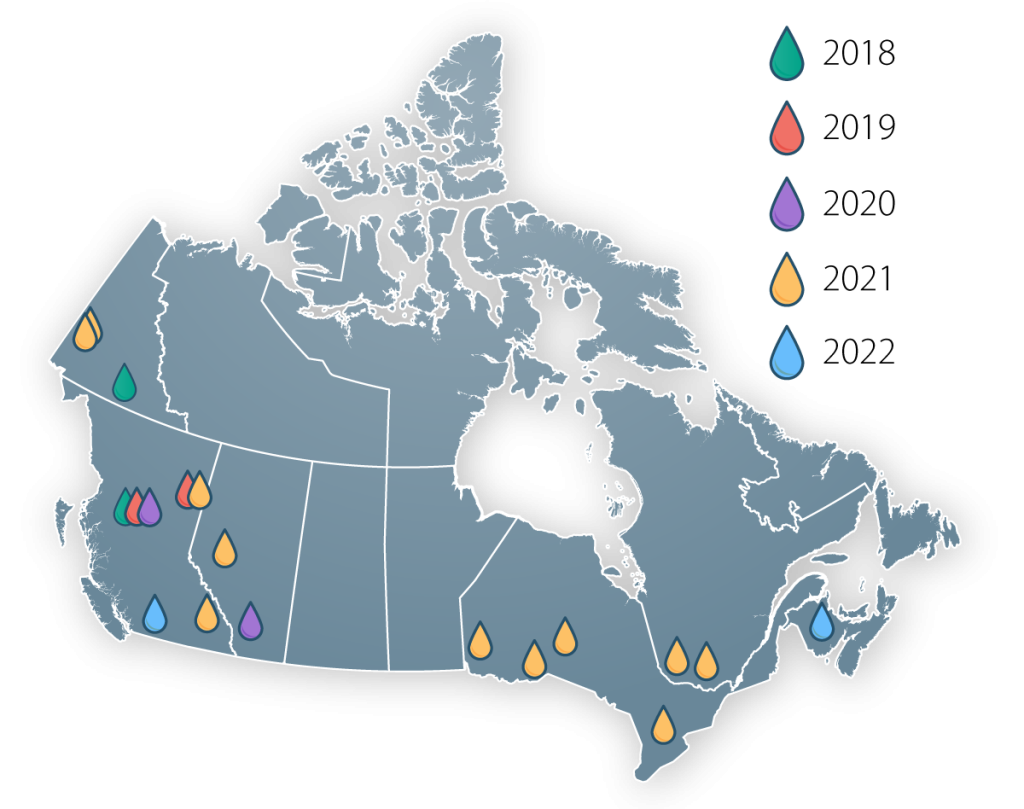
CABIN-STREAM Indigenous trainings 2018-2022 delivered by Living Lakes Canada
- 2022 - Based on data sovereignty principles advanced by the Water Hub, the Nicola 5 First Nations, who make up the Nicola Watershed Governance Partnership with the Province of BC, selected Living Lakes Canada through a Request for Proposal process to build their new water data portal, which launched in 2024.
- 2022 - In the Columbia Basin, groundwater monitoring sites were established in collaboration with the Yaq̓it ʔa·knuqⱡi ‘it and a groundwater monitoring training was held for five youth in the ʔaq̓am Guardians in Training program.
- 2022 - Living Lakes Canada hosted 2 full-day Elder Engagement sessions with elders from the ʔakisq̓nuk First Nation and Shuswap Band to create the time and space for discussions around water concerns and priorities. The perspectives gathered during these sessions informed the selection of a monitoring site on Windermere Creek as part of the Columbia Basin Water Monitoring Framework.
- 2022 - Living Lakes Canada helped facilitate the three-part webinar series Indigenous-led Water Relationships within the Columbia Basin, which was organized to create space, time and place for a Knowledge Holder and a technician from three Indigenous Peoples (Ktunaxa, Secwépemc, Syilx Okanagan) to present on their values, how they relate to water and the future of water. Over 600 people registered for the series of 3-hour webinars. The success of the event was built upon the strong relationships that Living Lakes Canada has with the Ktunaxa, Secwépemc, and Syilx Okanagan Knowledge Holders and technicians who saw the value in sharing their perspectives in this way.
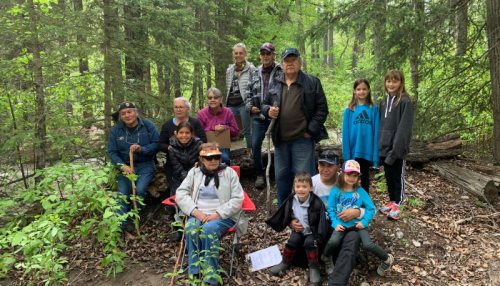 2022 Elder engagement session with ʔakisq̓nuk First Nation, B.C. Living Lakes Canada Photo
2022 Elder engagement session with ʔakisq̓nuk First Nation, B.C. Living Lakes Canada Photo
- 2021 - The Let’s Talk About Water International Film Festival recognized our short movie “Alhgoh ‘uts’ut’en (We all work together) for Water” documenting CABIN-STREAM training with the Binche Whut’en First Nation in B.C. and Living Lakes Canada’s relational approach to reconciliation.
- 2021 - With a focus on Reconciliation and relationship building, Living Lakes Canada recruited an Applied Reconciliation Coordinator to lead our specialized Applied Reconciliation program with a specific mandate to support the organization’s meaningful collaborations with Indigenous communities, ensuring this relationship-centric lens is applied to and prioritized in all programs.
- 2021 - Ktunaxa scholar and researcher Michele Sam delivered a series of workshops to Living Lakes Canada staff so they could learn about dismantling colonial frameworks and how to develop sustainable and respectful cross cultural partnerships with place-based Indigenous Peoples. Michele is a ‘60s Scoop survivor and also shared about her personal experiences. This led to the launch of Living Lakes Canada’s Applied Reconciliation program that focuses on building relationships with Indigenous Peoples to ensure that water stewardship carried out on the traditional territories of Indigenous Peoples prioritizes Indigenous values, perspectives, and needs.
- 2018-2022 - Through the STREAM partnership (Sequencing the Rivers for Environmental Assessment and Monitoring) with WWF-Canada, ECCC and the University of Guelph, Living Lakes Canada trained 19 Indigenous partners in CABIN-STREAM protocols, building local capacity in aquatic health assessments. The Living Lakes Canada team travelled to deliver the trainings on partners’ traditional territories and also provided ongoing support for data collections and analysis, fostering continuing relationships with our partners.
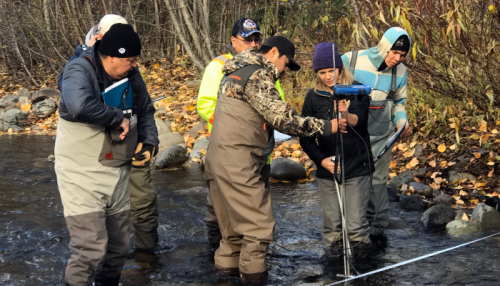 2018 pilot STREAM-CABIN Training in Smithers, B.C. Living Lakes Canada Photo
2018 pilot STREAM-CABIN Training in Smithers, B.C. Living Lakes Canada Photo
- 2017 - Shortly after incorporating as an independent charity, Living Lakes Canada hosted a Water Data Dialogue conference with experts from across America to explore open source data for increased transparency and data democracy at the local community level, while honouring Indigenous data sovereignty. Plenary speaker Dr Christopher Horsethief, Ktunaxa research professor, laid the groundwork for the Columbia Basin Water Hub, which is guided by the First Nations principles of OCAP® (Ownership, Control, Access, Possession). Living Lakes Canada applies the First Nations principles of OCAP® to all our work where water data is collected on the traditional territories of First Nations, and to do so, funds the certification of all staff in the Fundamentals of OCAP® course.
- 2013 - Living Lakes Canada initiated the joint "Think Like a Watershed" conference with the Ktunaxa Nation who hosted the Salmon dinner via the Columbia Basin Intertribal Fisheries Council. Living Lakes Canada invited Stephen Kawfui, the former Indigenous premier of NWT, who attended and shared his knowledge about Indigenous-driven water stewardship initiatives. These insights also informed our Columbia Basin Water Monitoring Framework and Columbia Basin Water Hub.
- 1994-2005 - As volunteer branch president of the East Kootenay Environmental Society, Invermere branch, Living Lakes Canada’s founder started what became the successful multi-decade campaign to save Jumbo Valley from development. Thirty years later this area known to the Ktunaxa Nation as Qat’muk, home of the grizzly bear spirit, became the Qat’Muk Indigenous Protected and Conserved Area. This achievement was built on decades of relationship building and collaboration between First Nations and environmental NGOs who were deeply aligned on conservation and stewardship issues.
- 2004-2010 - Living Lakes Canada initiated the Lake Windermere Project as a collaborative effort between regional Rights holders and stakeholders to save Lake Windermere in the East Kootenay, BC after the burbot fisheries collapsed. This five-year project based on multi-sector relationship building between Indigenous and non-indigenous partners won the inaugural REFBC Land Award in 2010 and launched Living Lakes Canada as a water program.
CONTACT
To learn more, contact us at reconciliation@
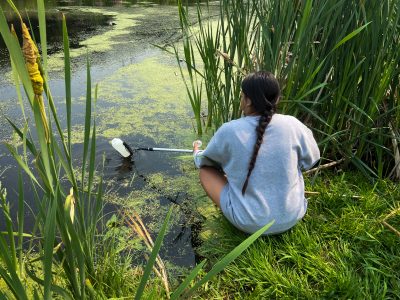
News and Updates
Indigenous-led climate action initiatives in partnership with UCalgary – University of Calgary, Dec 5 2025
Captíkʷł guides Nicola Lake survey to improve foreshore health – Merritt Herald, Nov 29 2024
Confluence of Knowledge: Yukon lake stewards gather for Celebrating The Lakes – Living Lakes Canada, Jan 17 2024
Braiding Indigenous Knowledge & Western Science: Groundbreaking approach applies both worldviews to lake management – Living Lakes Canada, Jun 21 2023
Data for self-determination: Qʷúʔ, siwɬkʷ (water) data hub to support Indigenous watershed governance and protection – Living Lakes Canada, May 24 2023
The Youth Perspective: Setting Sockeye Salmon free in the Columbia River – Living Lakes Canada, May 24 2023
Resources
- Celebrating The Lake Sharing Back Report
- Indigenous Knowledge and Values Framework: Foreshore Integrated Management Planning on Nicola Lake
- The First Nations Principles of OCAP®
- Ktunaxa Knowledge Relationships: Jim Clarricoates & Norm Allard
- Secwepemc Knowledge Relationships: Kukpi7 Wayne Christian & Robyn Laubman
- Syilx-Okanagan/Sinixt Knowledge Relationships: Byron Louis, Dallas Goodwater & Rob Edward



